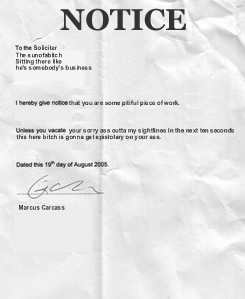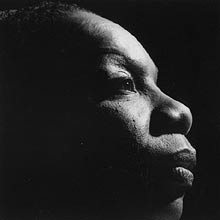Getting dissipated...
 Dissipation is more than the fate of the universe. It's a state of mind.
Dissipation is more than the fate of the universe. It's a state of mind.<<<<
Now there's a lady who knew how to wear a hat.
<<<<
The Neglected Web Presence of the Undead
 Dissipation is more than the fate of the universe. It's a state of mind.
Dissipation is more than the fate of the universe. It's a state of mind.
 Never believe a queen who says that, or who begins any rant with the words, "Look, I'm sorry I'm such a bitch, but..."
Never believe a queen who says that, or who begins any rant with the words, "Look, I'm sorry I'm such a bitch, but..." Well some of Freud is dead. Like pop psychology and jive talk therapy - the most annoying additions to the 20th century, aside from war, famine, pestilence, big hair, and valley girls - those are dead. But then there was that usefully cool shit about Oedipus, the death drive, fantasy, and ideology.
Well some of Freud is dead. Like pop psychology and jive talk therapy - the most annoying additions to the 20th century, aside from war, famine, pestilence, big hair, and valley girls - those are dead. But then there was that usefully cool shit about Oedipus, the death drive, fantasy, and ideology.It is no accident...that Freud's reputation reached a low point in the early 1990s, which was not only the height of the recovered-memory hysteria, but also of the post-cold-war optimism that made a best seller of Francis Fukuyama's book "The End of History." Fukuyama predicted that the dissolution of the Soviet Union would pave the way for the triumph of liberal democracy around the world - an idea that came crashing to the ground one sunny morning in 2001...What Freud has to say, which is worth hearing even if analysis never cures another patient, is that history will never end. Because it is made by human beings.OK Newsweek, but even that sobering conclusion is too sanguine. Because in fact history can end whenever some Christian or Muslim Fundamentalist fucktard wants it that way.
Helen Fisher, a research anthropologist at Rutgers University, said in an interview that human partnerships are shaped by three independent neurochemical brain-body systems, responsible respectively for sexual attraction, romantic yearning, and long-term attachment.
"The three systems are very fickle. They can act together, or they can act separately," Dr. Fisher said. This, she said, helps explain why people can be wildly sexually attracted to those they have no romantic interest in, and romantically drawn to — or permanently attached to — people who hold no sexual interest. "Once the system is triggered, it's so chemically powerful that you can easily overlook everything about that person that doesn't work for you," Dr. Fisher said. "Even straight people have fallen in love with people they could never make a life with," she said.
 This is why I hate answering the dater's question - you know the one - So uh what r u lookin 4? - even though - as the article suggests - there would seem to be only three possible answers: sex, love, or stability. (1) The truth is you can never give the right answer - which is such a defiance of the laws of probability - that those of us who ever tried to answer that question honestly could really have done better and been more theatrical by casting spells or chanting incantations across the dinner table. (2) What people want can't be satisfied by someone who poses that question fifteen seconds after saying "hello" because - hello - life is not a cheap remake of Evita, nor does it obey the laws of Dramatic Unity whereby a young couple meets, fights, saves the world, fucks, and falls in love before the credits roll. (3) And here's where I get pretty damned biographical: any dumb sonuvabitch who can't share what he wants before he asks the same from me will be served notice: "Excuse me, but if you can't just say what you want, you should learn to make conversation, and you are too old not to know better. You've been served. Now good night."
This is why I hate answering the dater's question - you know the one - So uh what r u lookin 4? - even though - as the article suggests - there would seem to be only three possible answers: sex, love, or stability. (1) The truth is you can never give the right answer - which is such a defiance of the laws of probability - that those of us who ever tried to answer that question honestly could really have done better and been more theatrical by casting spells or chanting incantations across the dinner table. (2) What people want can't be satisfied by someone who poses that question fifteen seconds after saying "hello" because - hello - life is not a cheap remake of Evita, nor does it obey the laws of Dramatic Unity whereby a young couple meets, fights, saves the world, fucks, and falls in love before the credits roll. (3) And here's where I get pretty damned biographical: any dumb sonuvabitch who can't share what he wants before he asks the same from me will be served notice: "Excuse me, but if you can't just say what you want, you should learn to make conversation, and you are too old not to know better. You've been served. Now good night."
Pointing to the experiences of developing countries and former communist countries where interference with an independent judiciary has allowed dictatorship to flourish, O’Connor said we must be ever-vigilant against those who would strongarm the judiciary into adopting their preferred policies. It takes a lot of degeneration before a country falls into dictatorship, she said, but we should avoid these ends by avoiding these beginnings.The former Supreme Court Justice was talking to kids at Georgetown University who now have the same horrible insight as her plus the onerous duty of having to do something about it. Hey but don't let that spoil tonight's keg party kids!
 The End of History: I love that campy academic idea.
The End of History: I love that campy academic idea. Sunday night I read this uncannily accurate description of our present circumstances (quoted below) while preparing the post for our bicentennial. Here's what Hegel - in 1806 - says to us today:
Sunday night I read this uncannily accurate description of our present circumstances (quoted below) while preparing the post for our bicentennial. Here's what Hegel - in 1806 - says to us today:"The masses are the victims of the deception of a priesthood which, in its envious conceit, holds itself to be the sole possessor of insight and pursues its other selfish ends as well. At the same time it conspires with despotism which...stands above the bad insight of the multitude and the bad intentions of the priests, and yet unites both within itself. From the stupidity and confusion of the people brought about the the trickery of priestcraft, despotism, which despises both, draws for itself the advantage of undisturbed domination and the fulfilment of its desires and caprices, but is itself at the same time this same dullness of insight, the same superstition and error."

“The first tenet of the liberal religion is that everything (at least in the realm of expression and ideas) is to be permitted, but nothing is to be taken seriously...strongly held faiths are equally and indifferently authorized (????) as ideas people are perfectly free to believe, but they are equally and indifferently disallowed (????) as ideas that might serve as a basis for action or public policy.I personally think much of Arab and Middle East culture is gorgeous. But the Arabs of Fish's article and of this episode are Muslim fundamentalist extremists: they get no credit from me except for rational complaints about US foreign policy in the Middle East. To be blunt to Stanley Fish, he overplayed his hand and showed us the cards he’s holding: the fantasy at the core of his screed is there in his own words: “deference” to fundamentalist believers - the content of whose faith “may be life itself.”
Should one of (the strongly held faiths) ask of us more than we are prepared to give -- ask for deference rather than mere respect -- it will be met with the barrage of platitudinous arguments....One of those arguments goes this way: It is hypocritical for Muslims to protest cartoons caricaturing Muhammad when cartoons vilifying the symbols of Christianity and Judaism are found everywhere in the media of many Arab countries. After all, what's the difference?
The difference is that those who draw and publish such cartoons in Arab countries believe in their content; they believe that Jews and Christians follow false religions and are proper objects of hatred and obloquy.... for (Arabs) the content may be life itself.... the difference, I think, is to the credit of the Muslim protesters and to the discredit of the liberal editors.”
“...a firm adherent of a comprehensive religion doesn't want dialogue about his beliefs; he wants those beliefs to prevail. Dialogue is not a tenet in his creed, and invoking it is unlikely to do anything but further persuade him that you have missed the point -- as, indeed, you are pledged to do, so long as liberalism is the name of your faith.”This the best that Nihilist academics can offer us...tie our hands with accusations of moral relativism, exalt the fundamentalist, celebrate a contest of wills, and dare us contemptuously to lose our nerve.

 Don't ask me what I'm reading...
Don't ask me what I'm reading..."During WWI, a nurse discovered that patients who received coffee grounds in their enemas recovered from serious wounds at a much faster rate than those who received regular enemas....CAUTION: Do not use coffee enemas for more than six weeks at a time."Just in case you were wondering I guess.
 Allow me this rhapsody on Crash (2004) which I finished last night well after midnight. I have two votes for the academy's consideration.
Allow me this rhapsody on Crash (2004) which I finished last night well after midnight. I have two votes for the academy's consideration. I give Thandie Newton a best actress tap in Crash. The girl is gorgeous. I first noticed her in The Truth About Charlie
I give Thandie Newton a best actress tap in Crash. The girl is gorgeous. I first noticed her in The Truth About Charlie  where she played next to Mark Walberg in a remake of Charade (1963) starring Cary Grant and Audrey Hepburn....so going off topic...I would tell you that Thandie channeled Audrey in Charlie, but that cannot begin to describe what she did with Audrey's original persona...so pardon me while I offend Audrey's fan base...but Thandie raised the bar over Audrey's juvenile charm by doing the impossible. She added to Audrey's feminine innocence just a touch of something naturalistic and amoral - a very wet and incendiary secktual energy - all the while capturing Audrey's sweetness, vulnerability, and effervescence. She was incredibly seductive next to that secks hammer Marky Mark. And how charming was it to end this movie with Charles Aznavour serenading the couple while they danced through the closing credits on the sidewalks of Paris? OMG!
where she played next to Mark Walberg in a remake of Charade (1963) starring Cary Grant and Audrey Hepburn....so going off topic...I would tell you that Thandie channeled Audrey in Charlie, but that cannot begin to describe what she did with Audrey's original persona...so pardon me while I offend Audrey's fan base...but Thandie raised the bar over Audrey's juvenile charm by doing the impossible. She added to Audrey's feminine innocence just a touch of something naturalistic and amoral - a very wet and incendiary secktual energy - all the while capturing Audrey's sweetness, vulnerability, and effervescence. She was incredibly seductive next to that secks hammer Marky Mark. And how charming was it to end this movie with Charles Aznavour serenading the couple while they danced through the closing credits on the sidewalks of Paris? OMG!
 Personal mythology, an attempt to account for the accidents of birthplace and time? My place, a town named La Moure. Probably a French surname, La Moure looks and sounds like love, and that spelling has a queer "e" on the end. My time, 45 days after the French student and worker rebellions of May 1968. I get a tingly feeling looking at the political posters of the time. My favorite had a sense of humor: "We are all undesirables!"
Personal mythology, an attempt to account for the accidents of birthplace and time? My place, a town named La Moure. Probably a French surname, La Moure looks and sounds like love, and that spelling has a queer "e" on the end. My time, 45 days after the French student and worker rebellions of May 1968. I get a tingly feeling looking at the political posters of the time. My favorite had a sense of humor: "We are all undesirables!" I saw her last night at a book signing in the Harold Washington Library. I first read Paglia in 1993 while skiing my brains out and working as a waitor in one of the ski resorts of Winter Park, Colorado. That winter was a template for my adult life since: filling every day with intense physical and mental exercise. Work, ski, read, repeat!
I saw her last night at a book signing in the Harold Washington Library. I first read Paglia in 1993 while skiing my brains out and working as a waitor in one of the ski resorts of Winter Park, Colorado. That winter was a template for my adult life since: filling every day with intense physical and mental exercise. Work, ski, read, repeat! Before she was the keeper of a dream, she was a young woman in love with a man who would share her life's work and change the world.
Before she was the keeper of a dream, she was a young woman in love with a man who would share her life's work and change the world.
 To my friends Kurt, Dennis, Harry, and Michael: "It's not Sunday morning if Sister Clara's not slain by the spirit!"
To my friends Kurt, Dennis, Harry, and Michael: "It's not Sunday morning if Sister Clara's not slain by the spirit!"  I can't believe it, but I just saw Some Kind of Wonderful (1987) for the first time ever over this morning's coffee. This teen movie is like Sixteen Candles meets I Shot Andy Warhol. Mary Stuart Masterson plays (yet another) lesbian-inflected straight girl (love that). But she's got a crush on sensitive artist Eric Stoltz who plays Dante to Lea Thompson's Beatrice.
I can't believe it, but I just saw Some Kind of Wonderful (1987) for the first time ever over this morning's coffee. This teen movie is like Sixteen Candles meets I Shot Andy Warhol. Mary Stuart Masterson plays (yet another) lesbian-inflected straight girl (love that). But she's got a crush on sensitive artist Eric Stoltz who plays Dante to Lea Thompson's Beatrice.